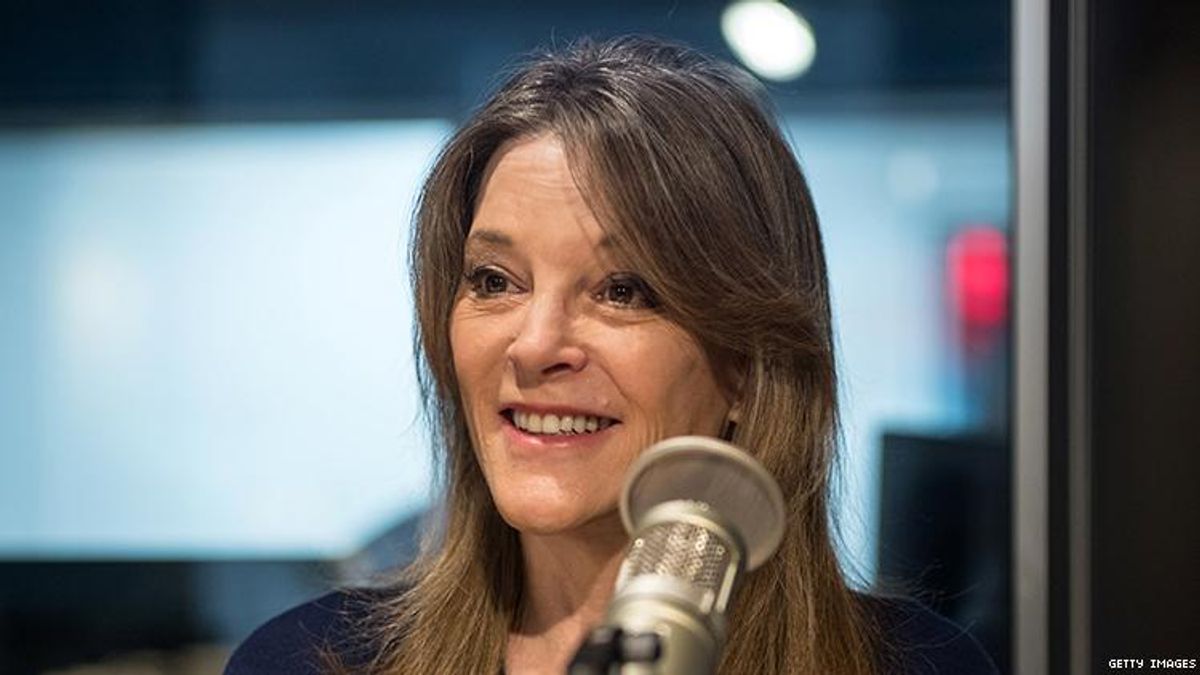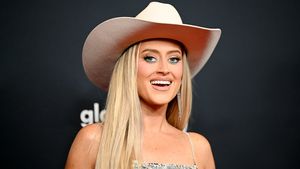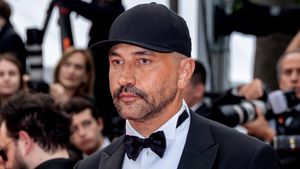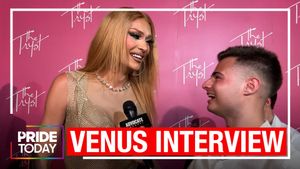Since announcing her candidacy in January, best-selling author and spiritual leader Marianne Williamson’s visibility has had a slow burn.
Last month, she was declared a major candidate by Nate Silver’s FiveThirtyEight, and on May 9 she reached the 65,000 unique voter contributions threshold, as well as the 1 percent threshold in CNN’s latest poll. All are important markers to be invited to the first round of the DNC Presidential Debates in Miami on June 26 and 27.
Indeed, Americans are paying attention. Williamson's calm demeanor is a breath of fresh air from the aggressive rhetoric we have in place at the White House, and while there are critics who question whether she can last, there are those who argue that Democrats and Independents are eager for a political outsider to challenge Trump.
After all, Williamson has spent her entire career turning “crisis into opportunity.”
“I’ve realized that all a country is is a collection of individuals,” she explains. “For the same psychological and emotional principles that prevail within the journey of one person, prevail within the journey of a nation, and I want to apply those same skills of deep truth-telling and deep spiritual regeneration and internal transformation to the journey of this country that I have seen work such miracles in the journey of individuals.”
Williamson, a staunch HIV and LGBTQ activist since the 1980s, founded Project Angel Food, which in 1989 started delivering meals to homebound people living with HIV. She says it was LGBTQ folks and people living with HIV who helped "establish my career."
“When I began speaking in 1983, I was at a place called the Philosophical Research Society in the Los Feliz area of Los Angeles,” she explains. “Now, today, that's a kind of hip and happening neighborhood but in those days it was this far off, weird place… Not long after I began speaking, the AIDS crisis burst onto the scene… Organized religious institutions, for their own reasons dealing with their own issues, were profoundly silent for quite a while. In Los Angeles, it was so hard hit by [AIDS] and there was a young woman, myself, who talked about a God who loved us no matter what, and who works miracles. So, people affected by the virus, particularly gay men, began flocking to my lectures. And that was simply the river that flowed to my door.”
At the time, Williamson's sister had been diagnosed with breast cancer. "There was so much suffering, death, illness around me that the idea of starting a nonprofit organization that would provide nonmedical support services to people with life-challenging illnesses, when I first did it, I wasn't even thinking about AIDS specifically. But, at our first fundraiser, when I saw who showed up, who gave the party, who did the work, I looked around and I went, 'Oh my god. This is the AIDS community.' I knew that the organization was theirs."
She continues, "When we started, there were lectures and support groups three or four times a week. But, I thought it was an outgrowth of my lecture on a Course in Miracles. I wasn't thinking of this only for the people who were ill. I was thinking of this as much for the people who were not ill. There were so many people affected who were members of the entertainment industry... its heart was so expansive around [HIV]. There was so much pain, and so many tears.... At that time, for some of these young men, telling their parents they were gay was as traumatic as telling their parents they were dying. So it was like being in a war zone, and all we had was love for each other. It was a very profound experience. You're marked forever by something like that."
She adds, “Americans are very good at showing up for each other after a tragedy has already occurred, but we need to show up with greater love for each other so as to prevent many tragedies from occurring.”
Today, Project Angel Food has served over 11 million meals. Williamson also cofounded The Peace Alliance in 2004, and continues to advocate for the creation of a U.S. Department of Peacebuilding.
During Donald Trump's State of the Union speech, he vows to end HIV by the year 2030. When asked if it was possible, Williamson tells Plus: "Of course, [but] the issue is whether or not there's moral equivocation on the part of our leaders."
"We are experiencing challenges," she explains, "because we have basically transitioned from a government that prizes the concept of of the people, by the people, and for the people, to a government that basically has become of a few of the people, by few of the people, and for few of the people, of multi-national corporate corporations, by multi-national corporations, and for multi-national corporations. Our government at this time has become a system of failed aristocracy. It does more to advocate for short-term process for multi-national corporations than it does to advocate for the people of the United States and the people of the world and of the planet on which we live."
"So when you say, 'Is it possible?' Of course it's possible, it's called money. For a country, as much as for an individual, how you spend your money is an expression of your values. So what does money translate into with AIDS policy? It translates into more science, more scientific research, more medicine, more doctors. It's not a mystery here, so when you have a $2 trillion dollar tax cut, where 83 cents of every dollar went to the very richest corporations and individuals... then what you're doing is squeezing a huge amount of public treasury into the hands of a very few people, leaving less and less money available for the humanitarian and deeply democratic causes that would truly enable people to thrive."

Williamson is also proposing reparations for slavery, which she's been fighting for since the 1990s. As president, she plans on placing a council of slavery reparation and a board of trustees, recommending between $200 and $500 billion. That board of trustee would be entrusted with dispersing these funds over a period of 20 years, and the stipulation would be that the money is to be used for projects of economic and educational renewal for Black communities throughout the country.
“We have 11 states that don't even require half a year of American history, civics, and government, and that's dangerous in a democracy,” she explains. “If people do not learn as children what the Bill of Rights is, then how does that person grow up to be someone who's appalled when the Bill of Rights is under a fall. When it comes to race, I’ve noticed that even though I don't believe the average American is a racist, I do think the average American is woefully undereducated about the history of race in the United States. And so, just as part of the agreement between Germany and the Jews after WWII was to guarantee Holocaust education, I believe the United States owes it to our children and to our future that every American child grows up with a deeper level of understanding: American history, American civics, and American government.”
When thinking of a sustainable future, Williamson is branding her campaign with the principles that have defined her career: love and bridge-building.
“I remember being on television many years ago when the idea of [same-sex] marriage would be legal,” she shares. “I was one of the only people saying, ‘Of course it should be legal!’ And I remember saying to someone at the time, ‘I don't think you should be able to get married because you're gay, I think you should be able to get married because you're American. What should matter is that they're American. They have the same equal rights you have. This is America. This has got to be the ultimate, and the principle over personalities.”
“We have to take very seriously the notion that in America we must be there for each other,” she continues. “There has been those in our history who have struggled for those principles, sacrificed for those principles and even died for those principles. Our generation is being asked in our time to rise to the occasion. Democracy doesn't just give you rights, it gives you responsibility and I think whether you're gay, Jewish, Black or all the above, there are things we look at in our history and we can see where others like us, living in former times, were discriminated against, were victims of prejudice and oppression and sometimes violence. It is right and proper that we be aware of that, we take a stand, that we draw a line and we do everything possible to ensure that those after us will not suffer the persecutions of some of those who came before us.”
Williamson believe this idea should also translate beyond issues of discrimination, especially in relation to the new wave of anti-abortion laws that have been passed in multiple states.
“I think it’s horrifying what's happening,” she says. “I think that abortion is an issue of private morality. I don't believe the government should be legislating private morals. I believe that American women have a right to make their own moral decisions and their own biological choices, and this is an attack on women. This is an attack on the very idea that a woman is a full adult who can make her own adult choice. It's very concerning to me what's happening, but I believe that American women, one way or the other, will rise up and make it clear who we are and what we are made of.”
Williamson, who ran and lost as an Independent in 2014 for the seat of California’s 33rd congressional district despite having numerous endorsements from respected politicians, says that now is the time for voters to come together as a matter of principle over party.
“More people in this country love than hate,” she explains. “I believe that as a people we are good, we are decent, but we have a political system that does not speak to our decency and our ability so much to our self interest. At this time, I don't think the point is how to reach those who do not agree with us; the point is how to work with the people who we do agree with to make sure we have a change next year. We're all showing up the best we can in the roles that we're in, with the skillsets that we have, working with those who agree with us because that's what an election is.”
She adds, “If you look at the math, Donald Trump is not president just because certain bigoted people voted for him. He is also president [because] some very good people, I think, voted for him and also because of the people who didn't vote — all the people who voted third party. I don't think this is the time to worry too much about people who don't agree with you. It's time to become very involved, strategically and in an organizational way, with people who do agree with you so we can magnify the voices of tolerance, inclusion, mercy, justice, and love.”
When asked if she’s chosen a running mate, Williamson responds: “I have a long way to go before such a decision would be mine to make.”
Still, “There is a name that pops up. She at the moment shall go unnamed. I wonder, of course, would America elect a woman? And then an even deeper question: Would they elect two of them? Time will tell!”












































































